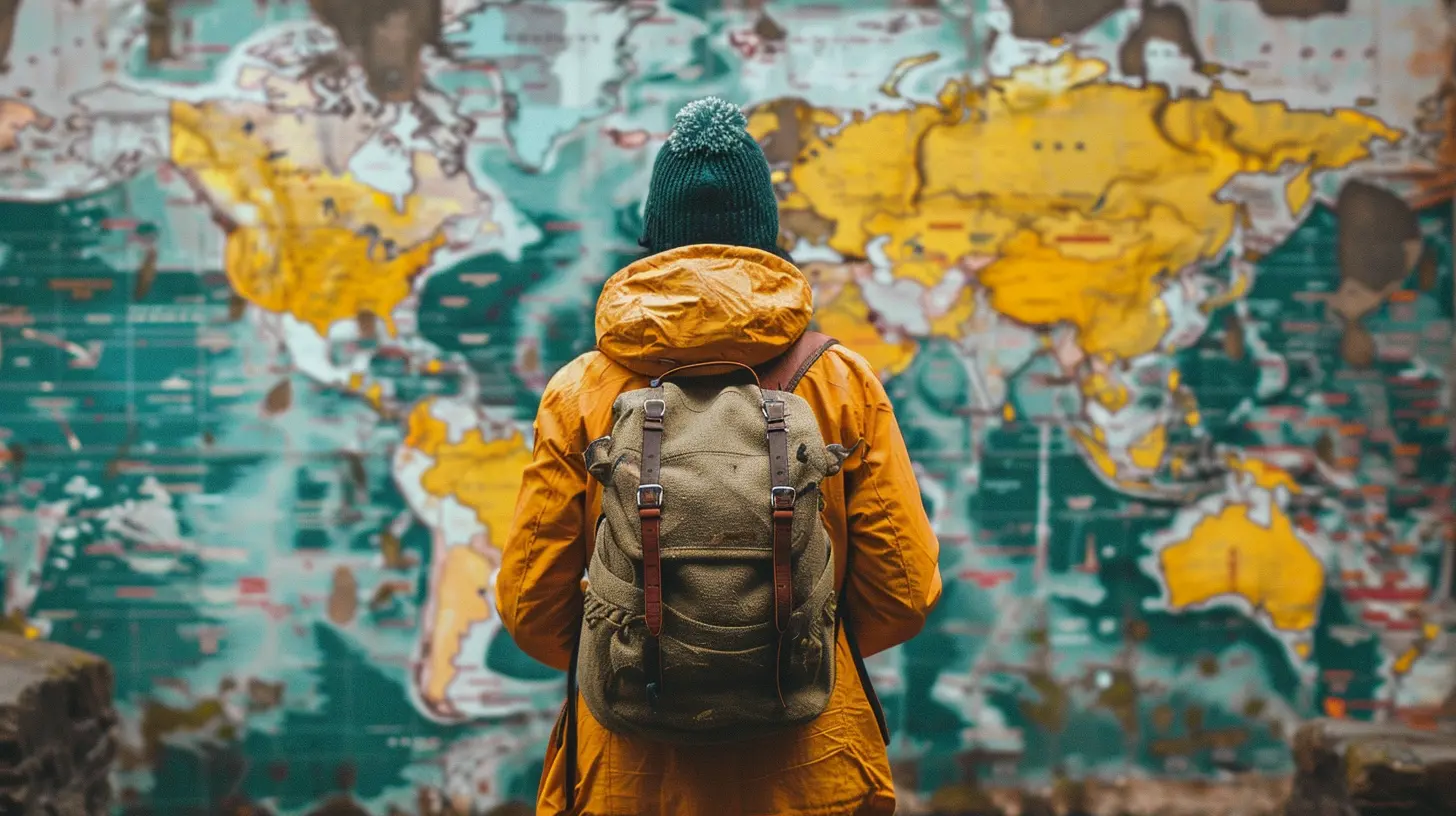What You Learn About Yourself While Studying Abroad
26 June 2025
Studying abroad isn’t just about ticking boxes for your degree. Sure, you’re there for academics, but let’s be honest — the real education happens outside the classroom. It’s in the late-night chats with roommates from different corners of the world, in the awkward attempts to explain your culture to strangers, or even in that moment when you're lost in a city where you barely speak the language.
If you’ve ever wondered how hopping on a plane to study in a foreign country might change you, keep reading. Let’s break down the unexpected, deeply personal lessons you’ll uncover about yourself through the ups and downs of studying abroad.
1. You Discover How Independent You Really Are
Ever thought you were independent just because you made your own instant noodles at 2 AM in college? Wait till you’re shopping for groceries in a language you barely speak or figuring out how to register your visa before a foreign deadline.Real Talk: You’re on Your Own (But In a Good Way)
Studying abroad is like a crash course in adulting. You’re in charge of everything — your meals, paperwork, budgeting, transport, and, oh yeah, your emotions too. You’ll realize that independence isn’t just about doing things alone, but being confident in your ability to figure things out without someone holding your hand.> "It’s not until you’ve assembled IKEA furniture in a tiny dorm room with instructions in Swedish that you really appreciate your inner strength."
2. You Get Clearer on What You Truly Value
Out of your comfort zone, stripped of your usual routines, and surrounded by brand-new perspectives, you’re forced to reassess what matters most. Spoiler alert: it’s not always what you thought.You See What Sticks
When your environment changes drastically, the little details fall away and your deeper values come to the surface. Maybe you realize how much personal freedom means to you. Or that community is more important than you gave it credit for. The random Friday nights, the casual dinners with your host family — suddenly, these things feel huge.Culture as a Mirror
Being in a different culture shows you your own. You notice things you never questioned back home — social norms, gestures, food habits, how people think about time, success, or relationships. And this contrast makes you reflect: “Wait, do I actually believe in that? Or was I just going with the flow?”
3. You Learn to Be Uncomfortable — and Be Okay with It
Let’s not sugarcoat this. Culture shock is real. So is homesickness. But so is growth.Awkward Is the New Normal
There will be embarrassing moments. You’ll mispronounce words, misunderstand social cues, and maybe get too much or too little change at a store. Guess what? Everyone who has studied abroad has been there.The key is learning how to sit with discomfort. It’s like a muscle — the more you flex it, the more you realize discomfort doesn’t control you. It becomes a sign that you’re growing.
> “Growth never happens in your comfort zone. It happens when you’re knee-deep in uncertainty, with a lopsided map and a backpack full of hope.”
4. You Become Exceptionally Adaptable
Life abroad throws curveballs. Train strikes. Miscommunication. A public holiday you didn’t know existed. Over time, you stop freaking out and start rolling with it.From Panic to Problem Solver
Your “adaptability muscle” gets strong fast. You’ll switch plans mid-route, find alternatives, and think creatively to survive and thrive. You become that friend who can fix anything.And once you’ve handled a bureaucratic mess in a foreign language? Trust me, you’ll feel like you can do anything.
5. You Understand Your Identity — More Than Ever Before
When you’re away from home, who are you without the familiar labels? No one knows your “reputation” from high school. You’re not "so-and-so's sibling" or "the class clown.” You’re just… you.A Blank Slate
Living abroad offers a clean slate. You get to reflect on how much of your identity is shaped by the society you came from versus who you are deep inside. You might find yourself embracing new parts or letting go of others that never quite fit.And seeing how other cultures define gender roles, family, ambition, or beauty can force you to confront your own internal scripts. It’s empowering, sometimes uncomfortable, but always eye-opening.
6. You Build Real Confidence (Not the Fake Kind)
True confidence isn’t about being the loudest in the room. It’s about knowing you’ll be okay, even when things go sideways. When you live abroad and solve problem after problem, that confidence starts growing — quietly but steadily.Because You Did the Hard Thing
You didn’t just take selfies at a landmark. You navigated an unfamiliar subway system. You made friends with people who didn’t speak your language fluently. You dealt with homesickness, culture shock, maybe even loneliness. And you came out stronger.Confidence is the quiet voice that says, “I’ve got this,” even when everything feels unfamiliar.
7. You Learn the Value of Connection — and How to Build It
Moving abroad means starting from scratch socially. That’s terrifying and exhilarating. You can’t just wait for friendships to happen — you have to make the first move.Making Friends from All Walks of Life
You become more open, curious, and intentional about relationships. You learn that connection goes beyond shared nationality or language. It’s about shared laughter, compassion, and moments.Friendships abroad often form fast and deep because everyone’s a little vulnerable. You’ll meet people you never would’ve met back home — and they’ll expand your world in ways you can’t imagine.
8. You Get Comfortable Saying “I Don’t Know”
When you’re in a space where you don’t know the customs, the language, or even how to flush a public toilet properly (yep, it happens), saying “I don’t know” becomes a survival skill.Humility = Growth
Saying “I don’t know” isn’t a weakness — it’s a doorway to growth. The more you admit what you don’t know, the more you learn. It’s humbling, sure. But it’s also how you evolve into a more curious, conscious version of yourself.9. You Start Thinking Differently — For Life
Living abroad reshapes your worldview. Things you took for granted at home no longer seem universal. It challenges your assumptions and opens your mind in ways no textbook ever could.A Bigger Picture Perspective
You’ll start to think globally — about politics, economy, rights, and even food. You'll understand nuances and see beauty in differences. And this shift doesn’t go away when you fly back home. It impacts how you approach your career, relationships, and everyday life.10. You Realize How Resilient You Actually Are
Studying abroad will test you — emotionally, physically, mentally. But here's the plot twist: you'll survive. More than that, you’ll thrive.The Inner Strength You Didn’t Know You Had
Whether it’s recovering from an illness without your parents nearby, dealing with a tough professor, or simply pushing through a lonely weekend, you’ll realize you’re more resilient than you gave yourself credit for.You adapt. You bounce back. You grow. And that resilience? It stays with you long after you’ve unpacked your last suitcase.
Wrapping It Up: You Don’t Just Learn — You Transform
Studying abroad is like holding up a mirror and seeing yourself in a whole new way. It’s less about the place and more about the person you become while navigating that place.You don’t come back the same. And that’s the whole point.
So if you’re on the fence about studying abroad — ask yourself, “What do I want to learn about myself?”
Because in between the hostels, new friends, strange snacks, and cultural mix-ups, you’re going to find someone incredible: you.
Bonus: Quick Tips for Getting the Most Out of Studying Abroad
- Journal your experience – You’ll want to remember the small stuff later.- Say yes (within reason) – Be open to spontaneous plans and experiences.
- Talk to locals – They’re the best teachers of culture and life.
- Get lost on purpose – You discover more than just places — you find pieces of yourself.
- Give yourself grace – Growth is messy, but it’s beautiful.
all images in this post were generated using AI tools
Category:
Study AbroadAuthor:

Zoe McKay
Discussion
rate this article
2 comments
Julia Phelps
Studying abroad reveals resilience, adaptability, and personal growth.
November 26, 2025 at 4:54 AM

Zoe McKay
Absolutely! Studying abroad challenges us to navigate new environments, fostering resilience and adaptability while promoting significant personal growth.
Anisa Stone
Studying abroad reveals unexpected strengths and perspectives—what a journey!
July 4, 2025 at 11:17 AM

Zoe McKay
Absolutely! Studying abroad truly transforms how we see ourselves and the world, uncovering hidden strengths and broadening our perspectives. It's a journey of self-discovery that lasts a lifetime.


